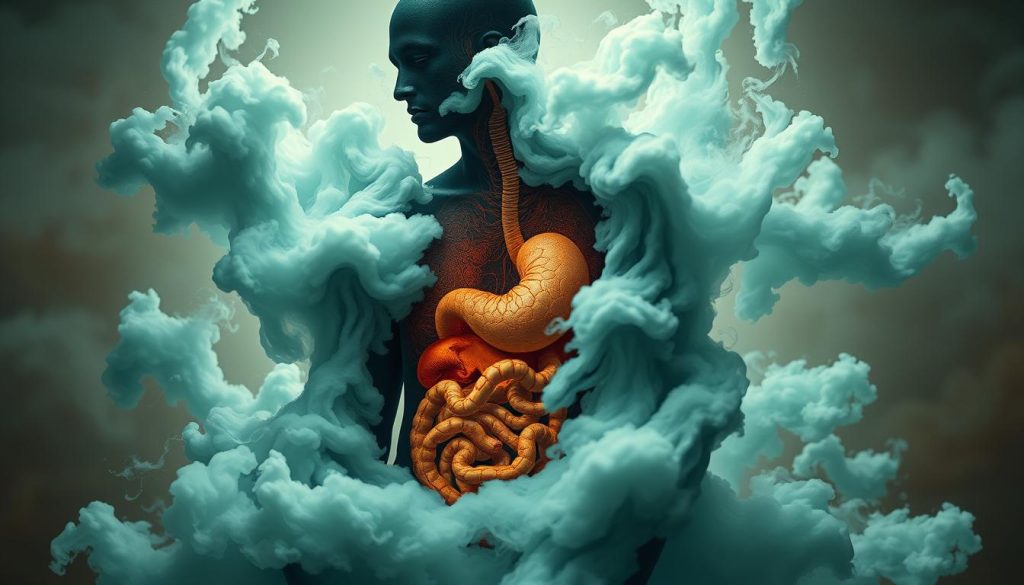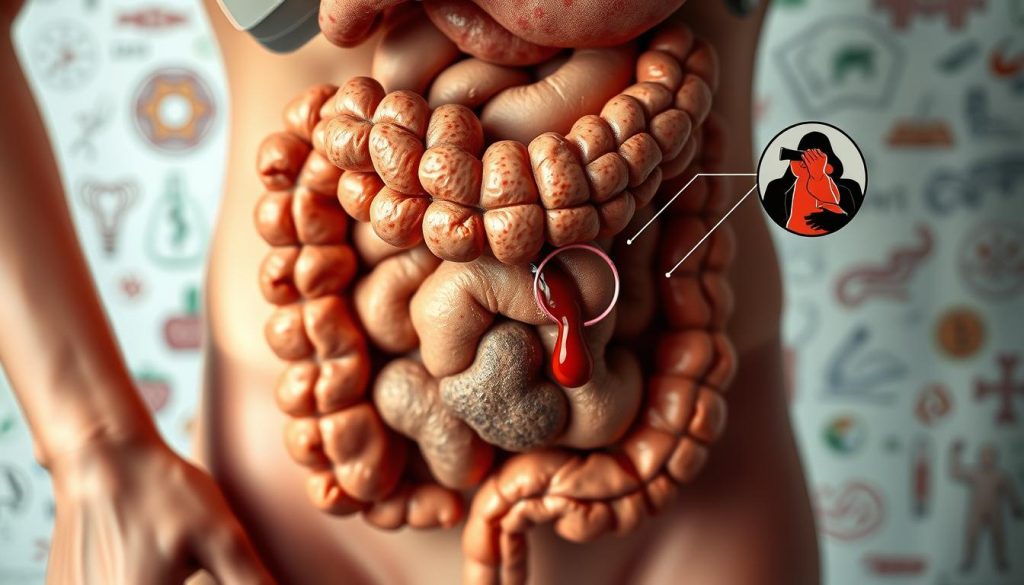Spotting the signs of colon cancer early is key to getting treatment fast. Colorectal cancer often grows quietly, so it’s vital to notice small changes in your body. This guide will cover the main warning signs of digestive cancer.
Changes in bowel habits and unexpected weight loss are signs to watch. Knowing these signs can lead to quick doctor visits. We’ll look at how colorectal cancer shows itself, helping you know when to worry.
Learning about these early signs is a big step in keeping yourself healthy. Keep in mind, many symptoms can have simple causes. But, it’s always smart to talk to a doctor if you’re worried.
Understanding Colon Cancer: A Comprehensive Overview
Colon cancer is a serious health issue in the U.S. This section looks at what colorectal cancer is, its risk factors, and why early detection matters. Knowing these details helps you spot colon cancer signs early and take care of your health.
What is Colorectal Cancer?
Colorectal cancer starts in the colon or rectum. It begins with small growths called polyps. These polyps can turn cancerous over time. Spotting intestinal cancer signs early is critical for effective treatment.
Risk Factors and Prevention
Many factors can raise your risk of colon cancer. Age, family history, and lifestyle choices are important. Here’s a look at common risk factors and how to prevent them:
| Risk Factors | Prevention Strategies |
|---|---|
| Age over 50 | Regular screenings |
| Family history of colon cancer | Genetic counseling |
| Smoking | Quit smoking |
| High-fat diet | Eat more fruits, vegetables, and fiber |
| Sedentary lifestyle | Regular exercise |
Importance of Early Detection
Spotting gastrointestinal cancer early can greatly improve treatment success. Regular screenings can find polyps before they turn cancerous. If you notice unusual symptoms or changes in bowel habits, see your doctor. Quick action could save your life.
Common Symptoms of Colon Cancer
Spotting colon cancer symptoms early can save lives. The signs often start small, so knowing them is key. Let’s look at important bowel cancer symptoms to watch for.
Changes in how often you go to the bathroom are a big warning sign. If you have diarrhea or constipation for more than a few days, it’s a red flag. Also, if your stools are narrow or ribbon-like, it could mean trouble.
Blood in your stool or rectal bleeding is a critical sign. It might look like bright red blood or make your stool dark and tarry. Don’t ignore this, even if it happens just once.
Abdominal discomfort is common in colon cancer patients. This can show up as:
- Cramps
- Gas pains
- Bloating
- Feeling of fullness
Unexplained weight loss and fatigue are also important signs. If you’re losing weight without trying or feeling very tired, see your doctor.
Keep in mind, these symptoms don’t always mean cancer. But if they keep happening, get medical help fast. Catching colon cancer early can greatly improve your chances of beating it.
Changes in Bowel Movements as Warning Signs
Watching your bowel habits is key to spotting colon cancer signs. A change in bowel habits might be an early sign of intestinal cancer. Let’s look at some important changes to watch for.
Persistent Diarrhea or Constipation
If you have diarrhea or constipation for more than a few weeks, pay attention. These ongoing changes could be early signs of colon cancer.
Unusual Stool Shape and Consistency
Notice the shape and consistency of your stool. Thin, pencil-like stools or very hard or soft stools that last are concerning. These might show a tumor blocking the colon.
Frequency Changes in Bowel Habits
A big change in how often you go to the bathroom is a key sign. If you’re going more or less than usual, it’s worth noting.
| Bowel Change | Potential Concern | Action |
|---|---|---|
| Persistent diarrhea/constipation | Possible tumor growth | Consult doctor if lasting 3+ weeks |
| Thin, pencil-like stools | Potential colon obstruction | Seek medical evaluation |
| Significant frequency changes | Possible colon abnormalities | Track changes and inform doctor |
While these signs might point to colon cancer, they could also mean other digestive problems. Always talk to your doctor for a proper check-up and diagnosis.
Recognizing Blood in Stool and Rectal Bleeding

Blood in stool and rectal bleeding are key signs of colorectal cancer. They can show up as bright red streaks or dark, tarry stools. Even if not always cancer, they need quick attention.
Rectal bleeding can look like:
- Bright red blood on toilet paper
- Pink or red-tinged water in the toilet bowl
- Dark red or maroon stools
- Black, tar-like stools (melena)
These signs can also mean less serious issues like hemorrhoids or anal fissures. Yet, seeing a doctor is key for the right diagnosis.
| Bleeding Type | Possible Cause | Action Required |
|---|---|---|
| Bright red on toilet paper | Hemorrhoids, anal fissures | Monitor, seek medical advice if persistent |
| Dark red in stool | Bleeding in lower GI tract | Immediate medical evaluation |
| Black, tarry stool | Upper GI bleeding | Emergency medical attention |
If you see odd changes in your stool or bleeding, see your doctor right away. Catching colorectal cancer early can greatly help treatment.
Abdominal Pain and Discomfort Patterns
Abdominal pain is a common symptom of colon cancer that shouldn’t be ignored. Understanding the patterns and types of discomfort can help you recognize digestive cancer warning signs.
Location and Types of Pain
Colon cancer-related abdominal pain often occurs in the lower left side of the belly. It can range from dull aches to sharp cramps. Some people describe it as a feeling of fullness or pressure.
Associated Symptoms
Abdominal discomfort linked to colon cancer might come with other signs:
- Bloating or gas
- Changes in bowel habits
- Nausea or vomiting
- Unexplained weight loss
When to Seek Medical Attention
Don’t wait to get checked if you experience:
- Severe or persistent abdominal pain
- Pain that wakes you at night
- Abdominal discomfort with rectal bleeding
- Pain accompanied by unexplained weight loss
Early detection is key in fighting colon cancer. If you notice any unusual abdominal symptoms, consult your doctor promptly for proper evaluation and care.
| Pain Characteristic | Possible Indication | Action |
|---|---|---|
| Intermittent cramps | Early-stage colon issues | Monitor closely |
| Persistent, severe pain | Advanced digestive problems | Seek immediate medical care |
| Pain with other symptoms | Potential colon cancer | Schedule doctor appointment |
Unexplained Weight Loss and Appetite Changes
Unexplained weight loss and changes in appetite can be signs of colon cancer. These symptoms often start slowly, making them easy to miss. If you’ve lost weight without trying or notice a big drop in your appetite, don’t ignore it.
Many people with gastrointestinal cancer lose weight unintentionally. Cancer cells use a lot of energy, which can increase metabolism. Tumors can also mess with digestion and nutrient absorption, leading to weight loss.
Appetite changes are another common symptom. You might feel full quickly or lose interest in foods you once loved. These changes can start off small but get more obvious over time.
| Weight Loss | Appetite Changes |
|---|---|
| Unexplained loss of 10 pounds or more | Feeling full after small meals |
| Clothes fitting looser without diet changes | Loss of interest in favorite foods |
| Rapid weight loss over a short period | Persistent nausea or vomiting |
Remember, these symptoms can mean different things, not just colon cancer. If you notice unexplained weight loss or big appetite changes, see your doctor. They can check for other bowel cancer symptoms too.
Fatigue and Weakness as Early Indicators
Feeling tired and weak might not seem like typical symptoms of colon cancer. But they can be important warning signs. These feelings often sneak up on people, making daily tasks harder to complete. Let’s explore how fatigue and weakness connect to colorectal cancer symptoms.
Understanding Cancer-Related Fatigue
Cancer-related fatigue is more than just feeling sleepy. It’s a deep exhaustion that doesn’t go away with rest. This type of fatigue can be an early intestinal cancer indicator. People might feel drained all the time, even after a full night’s sleep.
Impact on Daily Activities
When fatigue sets in, everyday tasks become challenging. Simple things like cooking dinner or taking a short walk can feel overwhelming. This change in energy levels is often a red flag for colorectal cancer symptoms. If you notice a sudden drop in your ability to do normal activities, it’s worth talking to a doctor.
Connection to Anemia
Anemia often goes hand-in-hand with colon cancer. It happens when there’s not enough healthy red blood cells to carry oxygen through the body. This can lead to feelings of weakness and fatigue. Here’s a breakdown of how anemia relates to symptoms of colon cancer:
| Anemia Symptoms | Connection to Colon Cancer |
|---|---|
| Extreme tiredness | May indicate internal bleeding |
| Shortness of breath | Could be due to low red blood cell count |
| Pale skin | Sign of possible blood loss in the colon |
| Dizziness | Might result from lack of oxygen in the body |
If you experience ongoing fatigue or weakness, don’t brush it off. While these symptoms can have many causes, they’re worth discussing with your healthcare provider. This is true, even if you have other risk factors for colorectal cancer.
Gastrointestinal Discomfort and Bloating
Gastrointestinal discomfort and bloating are common signs of digestive cancer. These symptoms can be mild or severe. They might mean you have bowel cancer.

If you often feel bloated or have stomach pain, watch out. These could be signs of bowel cancer:
- Feeling full quickly after eating small amounts
- Abdominal swelling or distension
- Excessive gas or belching
- Cramping or pain in the stomach area
These signs can also mean other, less serious issues. But they might also show gastrointestinal cancer. Keep an eye on how often and how bad they get.
| Symptom | Possible Cause | When to Seek Medical Attention |
|---|---|---|
| Persistent Bloating | Gas, IBS, Ovarian Cancer | Lasts more than 2 weeks |
| Abdominal Pain | Indigestion, Ulcers, Colon Cancer | Severe or accompanied by other symptoms |
| Changes in Appetite | Stress, Stomach Cancer | Unexplained and lasting over a month |
If these symptoms keep coming back or get worse, see a doctor. Catching digestive cancers early can really help. It can make treatment better and increase chances of living longer.
The Role of Genetic Factors in Colon Cancer Risk
Genetic factors are key in figuring out who might get colon cancer. Knowing these factors helps spot people who should get checked early. This is important for catching colon cancer signs and symptoms early.
Hereditary Syndromes
Some people are born with genes that make them more likely to get colon cancer. Lynch syndrome and familial adenomatous polyposis are two such conditions. People with these often get cancer symptoms earlier than others.
Family History Considerations
Having a family history of colon cancer raises your risk. If a close relative has had colon cancer, your risk goes up. It’s key to watch for symptoms and talk to your doctor about your family history.
Genetic Testing Options
Genetic tests can show if you have genes that raise your cancer risk. These tests look for specific DNA changes. If you have a family history or early symptoms, your doctor might suggest a test.
Knowing your genetic risk helps you take control of your health. Regular checks and healthy habits can lower your cancer risk, even with a genetic predisposition.
Diagnostic Procedures and Screening Methods
Finding bowel cancer symptoms early is key to treating it well. Doctors use different tests to spot colon cancer and other digestive issues. Let’s look at some common screening ways.
Colonoscopy is the top choice for colon cancer screening. A doctor uses a long, flexible tube with a camera to check the whole colon. It can find and remove small polyps before they turn cancerous.
Fecal tests are less invasive. These include:
- Fecal Occult Blood Test (FOBT): Checks for hidden blood in stool samples
- Fecal Immunochemical Test (FIT): Detects blood proteins in stool
- Stool DNA Test: Looks for altered DNA in stool samples
Other methods include flexible sigmoidoscopy and CT colonography. Flexible sigmoidoscopy looks at the lower colon. CT colonography is a virtual colonoscopy using X-rays.
| Screening Method | Frequency | Pros | Cons |
|---|---|---|---|
| Colonoscopy | Every 10 years | Thorough examination, can remove polyps | Requires preparation, sedation |
| FOBT/FIT | Annually | Non-invasive, can do at home | May miss some polyps |
| Stool DNA Test | Every 3 years | Non-invasive, high sensitivity | Expensive, false positives |
Regular screening is key for catching colon cancer early. Talk to your doctor about the best screening for you. This depends on your risk factors and health history.
When to Contact Your Healthcare Provider
Spotting colon cancer signs early can greatly improve treatment chances. If you see any ongoing symptoms of colorectal cancer, it’s key to talk to your doctor right away.
Emergency Warning Signs
Some signs of gastrointestinal cancer need quick medical help. If you have:
- Severe abdominal pain
- Large amounts of rectal bleeding
- Persistent vomiting
- High fever with abdominal symptoms
Documentation of Symptoms
Keep a detailed log of your colon cancer signs to share with your doctor. Write down how often, how long, and how bad the symptoms are. This helps your doctor make a correct diagnosis.
Questions to Ask Your Doctor
Make a list of questions for your doctor about colorectal cancer symptoms. Ask things like:
| Question | Importance |
|---|---|
| What could be causing my symptoms? | Helps identify possible causes |
| Do I need any tests? | Figures out needed tests |
| What are my risk factors for colon cancer? | Looks at your risk level |
| How can I manage my symptoms? | Gives tips for symptom relief |
By watching for signs of gastrointestinal cancer and talking openly with your doctor, you can take care of your health. This helps address any concerns early on.
Prevention Strategies and Lifestyle Modifications
Reducing your risk of colon cancer is key. Eating a balanced diet with fruits, vegetables, and whole grains is important. These foods are full of fiber, which helps your bowel health and may lower cancer risk.
Regular exercise is also vital. Try to do at least 150 minutes of moderate exercise or 75 minutes of vigorous exercise weekly. Activities like brisk walking, swimming, or cycling are great. Staying healthy through diet and exercise can also lower your colon cancer risk.
Drinking less alcohol and quitting smoking are big steps for better health. Both habits increase colon cancer risk. Making these changes can lower your cancer risk and improve your health overall.
Don’t forget the importance of regular screenings. The American Cancer Society suggests starting screenings at age 45 for those at average risk. By following these steps and staying alert to your health, you can lower your colon cancer risk.
FAQ
Q: What are the most common symptoms of colon cancer?
A: Common symptoms include changes in bowel habits and blood in stool. You might also feel persistent abdominal pain, unexplained weight loss, and fatigue. Remember, these symptoms can also mean other health issues. Always talk to a doctor to find out for sure.
Q: How often should I get screened for colon cancer?
A: The American Cancer Society says start screening at 45 if you’re at average risk. How often you go depends on the test. Colonoscopies are usually every 10 years for most people. But, if you’re at higher risk, you might need to go more often.
Q: Can colon cancer be prevented?
A: You can’t completely stop cancer, but you can lower your risk. Eat lots of fruits, veggies, and whole grains. Cut down on red and processed meats. Exercise, stay at a healthy weight, drink less alcohol, and don’t smoke.
Q: What’s the difference between blood in stool and rectal bleeding?
A: Blood in stool looks black or tarry, from the upper digestive tract. Rectal bleeding is bright red, seen on toilet paper or in the bowl. Both can mean colon cancer and need a doctor’s check.
Q: Are there any genetic factors that increase the risk of colon cancer?
A: Yes, some genes raise your risk. Lynch syndrome and FAP are examples. Having a close relative with colon cancer also increases your risk. Genetic tests can spot these risks.
Q: What types of diagnostic procedures are used to detect colon cancer?
A: Tests include colonoscopy, sigmoidoscopy, and fecal occult blood tests. Colonoscopy is best because it lets doctors see the whole colon and remove polyps.
Q: How does colon cancer-related fatigue differ from normal tiredness?
A: Fatigue from cancer is much worse and doesn’t get better with rest. It affects your daily life and can be due to anemia, common in colon cancer patients.
Q: When should I be concerned about changes in my bowel habits?
A: Be worried if bowel habits change for more than a few weeks. Look out for changes in frequency, consistency, or trouble passing stools. Any big or lasting change needs a doctor’s talk.
Q: What questions should I ask my doctor if I’m concerned about colon cancer?
A: Ask about screening tests, your risk, and how to lower it. Discuss symptoms and what to do if they don’t go away. Don’t worry about small concerns.
Q: Can young adults get colon cancer?
A: Yes, colon cancer can happen to anyone, even young adults. It’s more common in older people but is rising in the young. Always talk to your doctor if you’re worried, no matter your age.


















